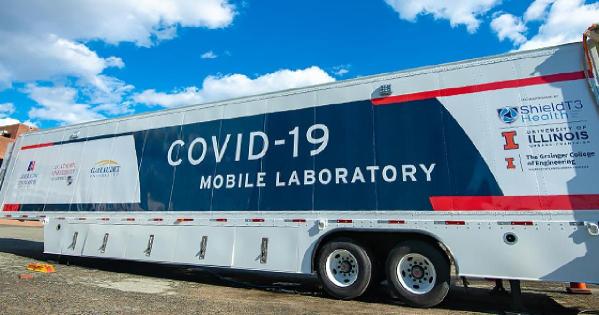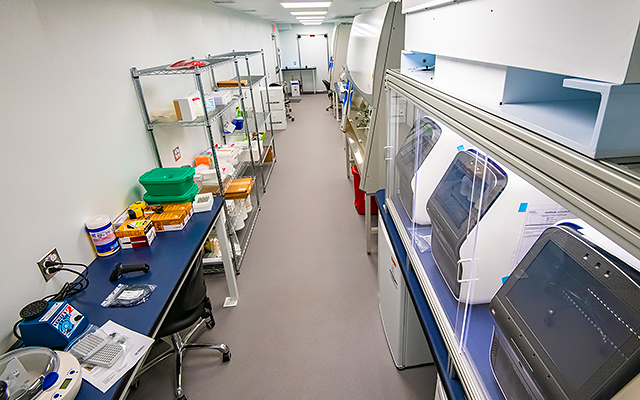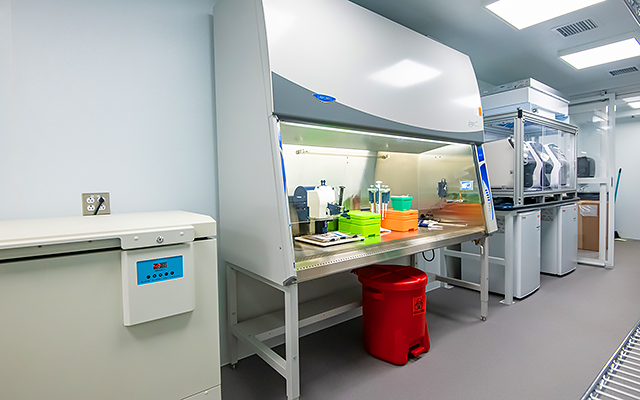New COVID-19 Testing Lab Will Help a Return to Campus

Fanta Aw doesn’t hesitate when asked what she misses most about life on campus.
AU’s vice president of campus life and inclusive excellence, Aw treasures her time on the quad, bumping into students, and members of the community. A stroll there presents a window into campus life.
“I miss the heartbeat of the campus where I have the opportunity to run into students and see how they're doing and to engage them because I'm first and foremost an educator,” Aw said. “I miss the opportunities to interact with my colleagues to learn from them and for us to learn together. And I miss this notion of what it means to be in the community and have community in this way.”
As AU lays the groundwork for a full return to campus, the university will take a big step forward in March towards ensuring campus and community safety with launch of a mobile COVID-19 testing lab. AU is spearheading the effort in partnership with the Consortium of Universities of the Washington Metropolitan Area, Gallaudet University, Catholic University, and Marymount University. The mobile lab can process as many as 50,000 tests in a week. The universities plan to use about 5,000 weekly tests at the start.
Significant capacity is being held back for new partners, and the consortium hopes more secondary schools will join. The Baltimore City School System will also participate after voting February 23 to join.
Gallaudet will host the lab on its campus. Created in partnership with the University of Illinois’ innovative and inexpensive COVID testing system, the lab relies on a saliva-based test and is scheduled to go live the first week of March for students. The lab will process faculty and staff starting a week later. The process will allow universities and school systems to get accessible and reliable testing with a quick turnaround.
“Robust COVID-19 testing is essential to the health and safety of the American University community and the entire DC region. Bringing together universities, K-12 schools, and community organizations to provide testing will increase knowledge about the virus, help prevent further community spread, and advance in-person activity,” said Sylvia Burwell, president of American University and former US Secretary of Health and Human Services. “By utilizing the diverse expertise of the collaborating institutions, we can address critical public health needs and support the communities where we live, work, and learn.”
The new lab won’t alter the testing process for American students, staff, and faculty, who will still take tests on the AU campus. The samples will then travel to the lab for testing. The saliva test should take about three minutes to complete, and the aim is to return results within eight hours after the test arrives at the lab. Members of the community will need to download an app to take the tests and get their results.

This joint effort to improve COVID testing came together after the consortium formed a group of faculty and experts to determine how they could expand testing in the region. AU led the effort to partner with Illinois' Shield T3 COVID testing system. Illinois performed 1.3 million tests on its students, and the Urbana-Champaign campus had a positivity rate of 0.3 percent in November, well below the state’s rate. Other universities across the country are also using the technology.
"The idea is universities should be problem-solving, finding solutions to critical issues of our time,” Aw said. "The T3 test was created at a university. As a consortium of universities, we understood that we needed to find proactive ways to address the need and respond to what has been a very challenging area. Universities help with the research piece."
The key to any return to normalcy will be robust testing of asymptomatic patients, university officials said. The speed of processing tests will curb the disease's spread and aid in a safe return. Testing and quick results will help the university isolate, quarantine, and conduct contact tracing with infected students, faculty, and staff, ensuring campuses' safety and the safety of surrounding communities.

The partnership between universities and secondary schools provides an innovative path to ensure safety in the communities.
"Universities are placed in cities and communities,” Aw said. "We are not separate in a bubble. Our ability to think about safe communities is an important concept. Our students have been incredibly responsible because we have seen that our off-campus students have been coming for testing. And by increasing our capacity for testing, I know and anticipate that there will be more students coming in for testing. It’s important because our [Changemakers] strategic plan talks about community.”
Aw said university officials have taken a holistic approach to the virus, beginning with masking requirements and ensuring compliance and physical distancing.
“What this means for the community is to have a robust testing program that allows us to increase testing capacity to do appropriate screening early enough so we can take the measures that we know are critical for containment,” Aw said. “So, this will help really with this other big part of the puzzle that we know is important. It means a safer community. It means responding to what we know from the science works.”
